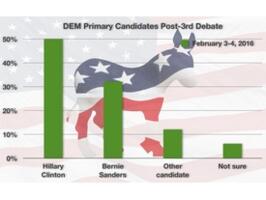Should Women Vote First for Women?
Prominent female supporters of Hillary Clinton declared over the weekend that women voters have an obligation to vote for a woman candidate, but voters overwhelmingly reject that notion.
The latest Rasmussen Reports national telephone survey finds that only four percent (4%) of Likely U.S. Voters believe it is more important for women to vote for a woman candidate because she is a woman. Ninety-one percent (91%) disagree and place more importance on where the woman candidate stands on the issues. (To see survey question wording, click here.)
Women are even more emphatic about this than men. Ninety-two percent (92%) of women voters say it’s more important for women to vote for a woman candidate because of where she stands on the issues. Just four percent (4%) say it’s more important to vote for her because she is a woman.
Voters are evenly divided when asked whom they would choose if given two candidates, one a man, the other a woman and all other things being equal. Twenty-nine percent (29%) say the man, another 29% the woman. But a whopping 42% are undecided.
When Rasmussen Reports asked this question a year ago, 26% said they would choose the male candidate, while 35% opted instead for the female. With Clinton likely to be the Democratic presidential nominee this year, it’s not surprising that there are stronger partisan differences on this question now than there were last year.
(Want a free daily e-mail update? If it's in the news, it's in our polls). Rasmussen Reports updates are also available on Twitter or Facebook.
The survey of 1,000 Likely Voters was conducted on February 9-10, 2016 by Rasmussen Reports. The margin of sampling error is +/- 3 percentage points with a 95% level of confidence. Field work for all Rasmussen Reports surveys is conducted by Pulse Opinion Research, LLC. See methodology.
Last year at this time, 79% of voters said it’s likely a woman will be elected president in the next 10 years, with 39% who considered it Very Likely. Seventy-nine percent (79%) said they personally would be willing to vote for a woman president.
Forty percent (40%) of women say they would choose a woman candidate over a man all other things being equal. Thirty-three percent (33%) of men would choose the man first given that scenario.
Voters of all ages are evenly divided on this question. Voters under 40 are slightly more likely to say it’s more important for women to vote for a woman, but the vast majority in this age group disagree,
There’s overwhelming partisan agreement, too, that it’s more important where the woman candidate stands on the issues.
But a plurality (47%) of Republicans would choose the male candidate over the female if all other things were equal. By contrast, 53% of Democrats would choose the woman. Among voters not affiliated with either major party, 21% say the man, 18% the woman, and 61% are not sure.
Forget New Hampshire: The November election is still shaping up as Clinton vs. Donald Trump.
Most voters think the next occupant of the White House is likely to be a Republican.
With the primary process finally underway, both Republicans and Democrats are more confident that the ideological leanings of their party's eventual presidential nominee will match theirs.
Only 41% of all voters now think American elections are fair.
Voters in surveys for years have supported women in the military being allowed to fight on the front lines and perform all the combat roles that men do. Men like that idea of women registering for the military draft, but most women don't.
Additional information from this survey and a full demographic breakdown are available to Platinum Members only.
Please sign up for the Rasmussen Reports daily email update (it's free) or follow us on Twitter or Facebook. Let us keep you up to date with the latest public opinion news.
The survey of 1,000 Likely Voters was conducted on February 9-10, 2016 by Rasmussen Reports. The margin of sampling error is +/- 3 percentage points with a 95% level of confidence. Field work for all Rasmussen Reports surveys is conducted by Pulse Opinion Research, LLC. See methodology.
Rasmussen Reports is a media company specializing in the collection, publication and distribution of public opinion information.
We conduct public opinion polls on a variety of topics to inform our audience on events in the news and other topics of interest. To ensure editorial control and independence, we pay for the polls ourselves and generate revenue through the sale of subscriptions, sponsorships, and advertising. Nightly polling on politics, business and lifestyle topics provides the content to update the Rasmussen Reports web site many times each day. If it's in the news, it's in our polls. Additionally, the data drives a daily update newsletter and various media outlets across the country.
Some information, including the Rasmussen Reports daily Presidential Tracking Poll and commentaries are available for free to the general public. Subscriptions are available for $4.95 a month or 34.95 a year that provide subscribers with exclusive access to more than 20 stories per week on upcoming elections, consumer confidence, and issues that affect us all. For those who are really into the numbers, Platinum Members can review demographic crosstabs and a full history of our data.
To learn more about our methodology, click here.





